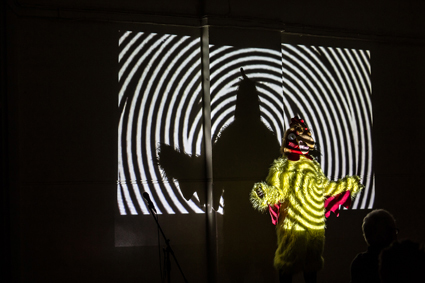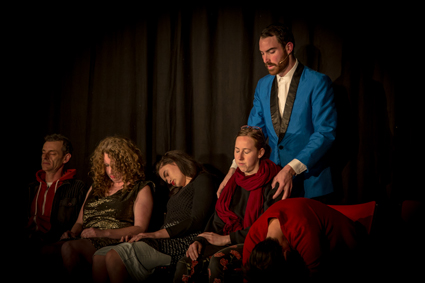The theatre of induced susceptibility
Urszula Dawkins: Bron Batten, Use Your Illusion

Use Your Illusion, Bron Batten
photo Bryony Jackson
Use Your Illusion, Bron Batten
Co-Curator of Melbourne’s eclectic Last Tuesday Society, Bron Batten, invited audiences into the dingily appropriate Collingwood Masonic Lodge in late August for her esoteric exploration of the art of hypnosis, Use Your Illusion. Supplied with voyeuristic pleasures, audience participation, cheese cubes and sliced kabana, spectators were drawn into a world of swinging pendulums and optical illusions; and equally, seduced by the mesmeric art of performance itself.
The venue’s somewhat clandestine side entry promises its own mysteries; entering the dimly-lit hall, three raised stages are apparent, the audience placed between them. We’re seated at large round tables dotted with tea-light candles and provisioned with the aforementioned snacks. A portrait of the young Queen Elizabeth II, muted to sepia over decades and too high for dusting, presides watchfully from the Lodge’s rear wall. On a side stage, Batten appears in a chicken suit, bathed in the light of a swirling, hypnotic spiral.
In a perhaps trance-inducing tone over spooky, meditative music, Batten gently, firmly and repeatedly issues her instructions: “You are going to enjoy the show immensely;” “Breathe deeply…let it all go;” “You will love me, you will love my show.” Her work done, the chicken exits. Next, there’s projected video of Batten on a couch, sobbing inconsolably, with a male (therapist’s?) voice crooning, “Take your time, Bron. We can wait till you’re ready.” But before we can become confused, it’s show time: pumping music, smoke and dancing laser-light draw us to the main stage where a now lamé-clad Batten reappears to introduce us to our ‘host’: professional hypnotist Charles Mercier.

Use Your Illusion, Charles Mercier
photo Bryony Jackson
Use Your Illusion, Charles Mercier
The ensuing lengthy (and very funny) demonstration of auto-suggestive techniques—which Mercier tells us are really just permission to release one’s inhibitions—uncovers rich territories of voyeurism and vulnerability, blurring the real and unreal. Mercier delivers his explanations like a serious professional while gesturing like a cheesy showman. After bringing 10 audience volunteers onstage alongside Batten, he hypnotises his subjects, inducing them to perform simple scenarios. They respond in varying degrees to requests to ‘walk down stairs,’ ‘be in a tropical resort,’ ‘walk the catwalk’ and so on. In watching, we, of course, are mesmerised too, enslaved to a fascination that’s tinged with the discomfort of our own laughter, as we watch people just like us doing slightly embarrassing things for our amusement.
It’s all rather silly—some of the volunteers themselves slip out of ‘trance’ to giggle as Mercier ups the ante with increasingly awkward requests. Gradually the ‘least receptive’ volunteers are culled, and those remaining ‘perform’ each new action in a state that may or may not be actual, but is riveting to watch because it is so free. Mercier uses his showman’s commentary to implant deeper ideas: at one point he describes these uninhibited behaviours in terms of the power and love that we all have in our bodies. I forget myself completely in the pleasure of watching a middle-aged ‘hypnotee’ dance for us, radiant and projecting joy like a woman in love. It’s magical, and a privilege to watch, regardless of what has unlocked her freedom.
Finally, only Batten is left on the stage. Mercier presents a final challenge, inducing her to perform a particularly physically uncomfortable task. Watching, the audience becomes complicit in a vulnerability that none of us moves to prevent, exposing the flipside of the ‘hypnosis’ created by the stage/audience divide.
The rest of Use Your Illusion leaps from the heartfelt to the wacky to the arcane to the self-helpy, without ever allowing the audience the safety of knowing what’s truth and what’s playful deception. There are self-critical confessions and positive affirmations, another chicken in a suit and a further scene of hypnosis that leaves far behind the showman’s piercing eyes and flashy tux.
Throughout the show, and around the long, central ‘demonstration,’ Bron Batten manages to juggle disparate scenes and styles, held together by our collective attention. Cohesion seems secondary to exploration: the ‘devised’ nature of the work is writ large, and ideas float free with all the plurality and contradiction of the things in life that are just a bit mysterious. One minute the feeling is ‘Be who you are!’ and the next, I know we’ve been duped. And in the next, I find myself reflecting on performing and watching: on who we are, who we think we are, how we ‘perform ourselves’ and who we might be if we really just relaxed.
And then I also think: what if that chicken at the start actually DID hypnotise us into loving the show? How would we know?
Bron Batten, Use Your Illusion, performers/devisers Bron Batten, Charles Purcell, Ben Liston, Beth Sometimes, composer Edward Gould; Collingwood Masonic Lodge, Melbourne, 21–24 Aug
RealTime issue #123 Oct-Nov 2014 pg. 37






